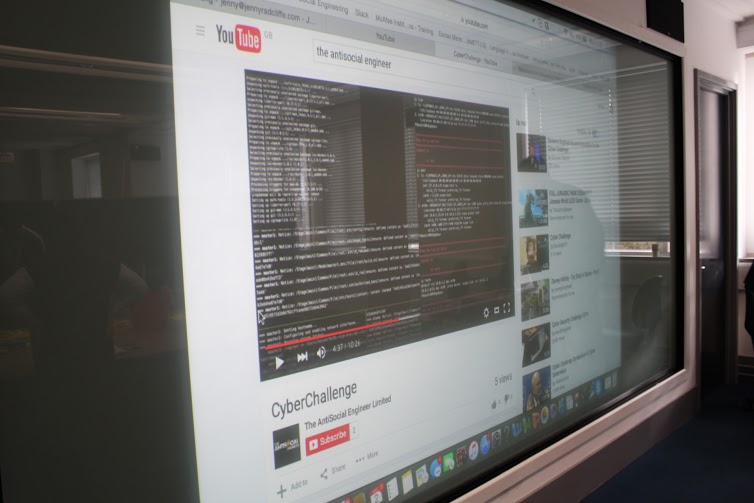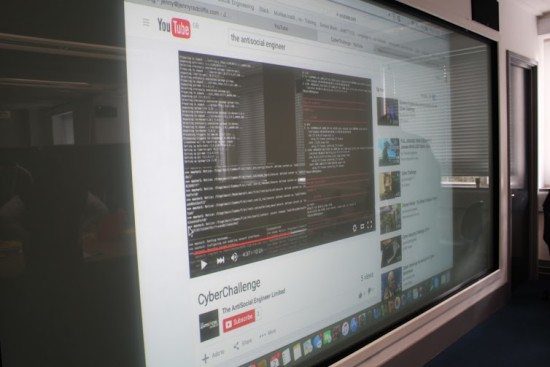-
 UK’s top seven school code breaking teams fight to become UK cyber champions
UK’s top seven school code breaking teams fight to become UK cyber champions -
Futuristic ‘Cyber City’ themed competitions will challenge contestants to infiltrate networks, stop criminals from causing damage to infrastructure, learn how to gather intelligence and find criminals
-
Cyber-battles designed by leading industry employers including National Grid, BT, Airbus Group, Raytheon, GCHQ, the National Crime Agency, CompTIA, Birmingham City University, University of Warwick, The Antisocial Engineer Ltd and Jenny Radcliffe Training
Seven teams of the UK’s best 13-18 year old code-breakers from schools across the country will today compete in an ‘I, Robot’ style cyber competition to become the ultimate young cyber security defenders. The competition, created by industry giants and government organisations, will task amateur sleuths to intercept messages and infiltrate networks in order to defend the fictional ‘Cyber City’ from criminals.
The winning school team will receive a £500 prize from AFCEA (Armed Forces Communications and Electronics Association) Academic Trust which will go towards bolstering technology skills in their institution, as well as a range of cyber and educational rewards.
The final, dubbed Cyber Games, which will take place in the Department of Computer Science at the University of Warwick, is the culmination of months of online competitions and coding exercises, where teams designed and submitted their own ciphers, then played against each other to climb to the top of the scoreboard. The final seven are the highest scoring teams and comprise some of the most prodigious young cyber talent in the country today.
The ‘Cyber City’ is fictional city of the near future, where all aspects of the city are digitally integrated and accessible via the Internet of Things. The city is under threat from a mysterious group of criminals and the teams will have to race against time to repair damage, solve problems and investigate the perpetrators in order to save the city from destruction.
The 28 finalists will be challenged to demonstrate their code breaking skills in front of industry experts in a series of live timed tests which will test their technical skills under pressure. Importantly, a strong emphasis will be placed on teams to adhere to the strict ethical and legal checks that law enforcement must abide by, for example when setting up wiretaps. They will also be tasked to analyse rubbish left in a hotel room to socially engineer passwords to their computer systems; overpower attacks on robotic arms within energy facilities; protect defence barriers in the waterways to block their escape route and perform digital forensics on networks in order to block malicious attacks.
The Cyber Games competition forms part of the Cabinet Office backed Cyber Security Challenge UK schools programme, which provides bespoke teaching resources, designed by its sponsor consortium and partners, to help address the critical cyber security skills gap by sparking interest student interest in cyber security.
The games have been created by some of the leading names in the cyber security industry including: National Grid, aeronautics specialist Airbus Group, defence giant Raytheon, national communications company BT, global IT trade association CompTIA, Birmingham City University, University of Warwick, GCHQ, the National Crime Agency and social engineering experts The Antisocial Engineer Ltd and Jenny Radcliffe Training.
Jason Stanton, Schools Programme Manager at the Cyber Security Challenge UK said: “There is a critical cyber security skills gap in the UK and in order to address this once and for all, we need to spark an interest in cyber security as a career at a young age. We work with our sponsor community to design fun, practical and realistic challenges that teach the core skills in an exciting way and can be delivered by any school in the country. Our aim is for the pupils to leave today feeling inspired and seriously considering a career in cyber. By offering a pathway to future employment, this helps prevent gifted children drifting into cyber-crime, providing a positive outlet for their talents.”
Sponsor quotes
Professor Tim Watson, Director of the WMG Cyber Security Centre at the University of Warwick
“We are delighted that together with Warwick’s Computer Science Department we are jointly hosting the 5th Cyber Security Challenge UK Schools’ Competition Live Final and providing one of the cyber security challenges. With the UK’s high-profile focus on cyber security, as outlined in the Chancellor’s recent speech at GCHQ, it is essential that we help to create the next generation of cyber security professionals. Cyber Security Challenge is providing an inspirational lead in talent spotting and is raising the profile and attraction of a career in cyber security within schools and universities. We are proud to be supporting their work.”
Rob Partridge, Head of the BT Security Academy
“It is vital that we act now to build the UK’s cyber security talent base at grassroots level. The UK cyber security industry will soon be worth £3.4 billion a year yet many children have never been told about the wide array of career opportunities in this field. The enthusiastic response to the competition that we have seen from teenagers across Britain demonstrates the huge pool of gifted youngsters that our economy could be tapping into.”
Jenny Radcliffe, Creative Director and Head of Social Engineering, Jenny Radcliffe Training
“It’s great to see Social Engineering as part of the Cyber Games this year. It’s very important to include the human element of cyber crime in this type of challenge because in the real world forgetting about it can be a huge mistake. Most crimes contain an element of social engineering and humans will always be vulnerable to manipulation, hacking the people is often easier than hacking the tech!”
Richard De Vere, Principal Consultant, The AntiSocial Engineer Limited
“Events like the Cyber Security Challenge competitions are essential to encourage the next generation of security professionals. With recent breaches seeing involvement from adults as young as 15, now is the time to actively encourage the good in our youth – not just publicise the bad.”
Dr Kevin Jones, Head of Cyber Operations Research Team, Airbus Group Innovations
“To ensure the long-term sustainability of the UK’s cyber security industry, we must engage the next generation in cyber security and research. Events such as the Cyber Games are a fantastic way to encourage young people into the sector and develop the talented cyber professionals of tomorrow.”
Graham, VP Skills Certification, Europe and Middle East, CompTIA
“CompTIA recently published research showing that 63% of UK Executives believe the cyber security threat is increasing, with almost half listing human error as a growing factor in security incidents including the use of social media and failure of to follow security procedures. It has never been more important to ensure that people starting work have some knowledge of the cyber security threats out there and understand how best to act. By raising the profile of cyber security through the use of interesting and fun competitions we are switching on a new generation of tech savvy kids to the vast opportunities, within the fast paced world of IT.”
Graham Le Fevre, Head of Business Development, Intelligence & Security, Raytheon UK
“As a leader in cyber security, Raytheon has a long history of supporting and growing talent in order to ensure business growth. There is a critical skills requirement in the cyber sector and through our STEM engagement programme we are committed to addressing the shortfall to this requirement. These Cyber Security Challenge UK games are designed to illustrate how the higher education sector can play a role in solving ‘real-world’ cyber security issues on a global scale. Not all cyber security professionals come from the same backgrounds; there is a great deal of variety within the talent pool. From our experience, we found the best analysts can range from software developers to postmistresses and researchers, through to server engineers and helpdesk workers. Each fresh mind brings a new dimension and potential, and it is the responsibility of companies like Raytheon to steer and guide those careers.”
About Cyber Security Challenge UK
Cyber Security Challenge UK – With the backing of founding sponsors like the SANS Institute, the Challenge started out in 2010 to create a series of virtual and face-to-face competitions that would identify talented people for the cyber security industry. Now entering its 6th year the Challenge is backed by over 50 of the UK’s most prestigious public, private and academic organisations, and hosts a wide programme of activities designed to spread the word about why cyber security is such a fulfilling and varied career and help talented people get their first cyber security jobs. Working from school level right through to helping career changers making the transition across, the Challenge is making a notable difference to the career prospects of those with the talents and aptitude to become cyber security professionals.
About Cyber Security Challenge Schools Programme
Since launching in May 2013 the Schools Programme has recruited secondary school teachers from across the UK to deliver bespoke lesson plans and encourage students to compete against their peers online and at live events to win prizes selected to support their Schools’ Computer Science curriculum. Although not included in the new National Curriculum, Cyber Security is vital to the safety and prosperity of the UK. The Challenge will provide a free learning programme to ensure our young people enter the workforce or pursue academic careers with all of the knowledge and skills necessary to become successful cyber security professionals.
The opinions expressed in this post belongs to the individual contributors and do not necessarily reflect the views of Information Security Buzz.



